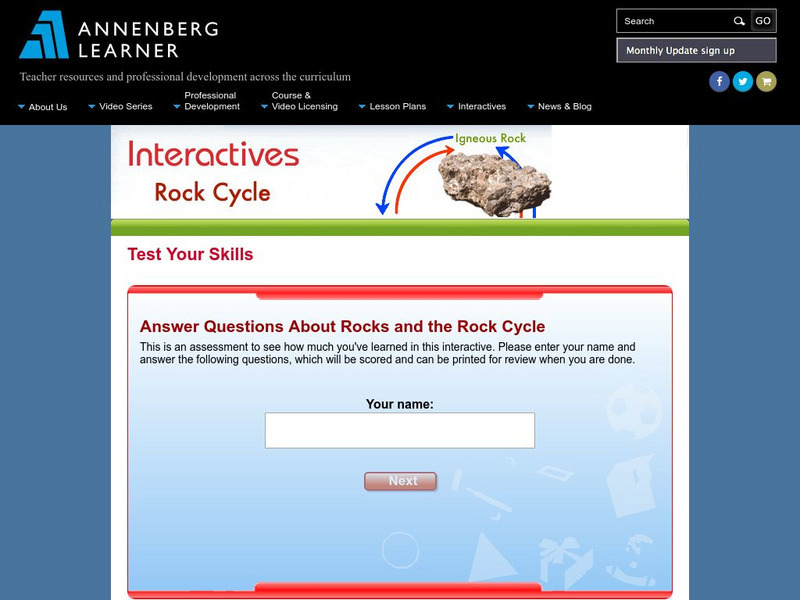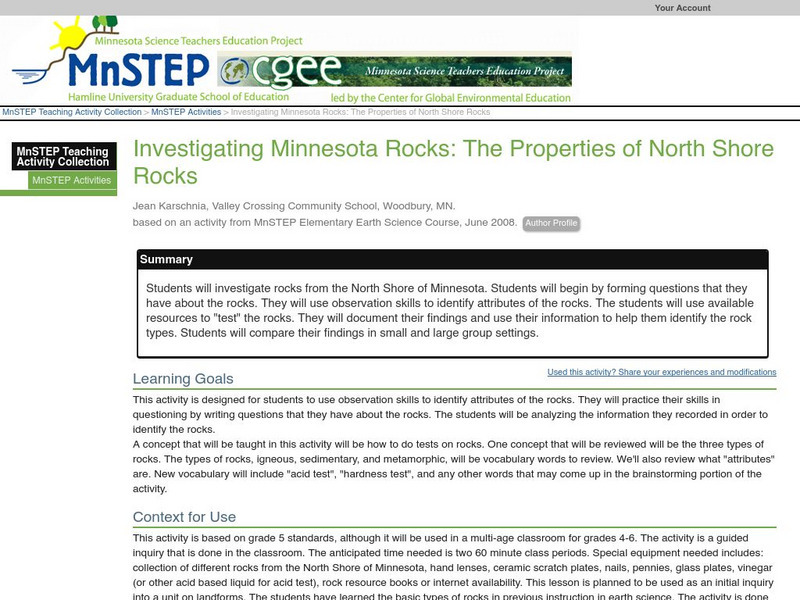Hi, what do you want to do?
Curated OER
Luray Caverns - Rock Formation
Fifth graders conduct research on the geological formation Luray Caverns located in Luray, Virginia in preparation for a field trip to the caverns. They conduct Internet research, and answer worksheet discussion questions.
Curated OER
Biosphere
There is so much to learn about the different cycles, processes, and parts of the biosphere. Using a pretest as a formative assessment to see what your budding ecologists already know is a great way to figure out which important areas...
Columbus City Schools
Thinking Like A Soil Scientist
Ready to roll up those sleeves and get your hands dirty? Dirty with soil science content, that is! Overcome those "But it's just dirt" objections with a trip outside to collect soil samples for some in-class analysis. Use the...
Curated OER
Wipe Out
Learners examine the flow of water. They observe and test the properties of water by using sticks in flowing water. The lesson has streaming video, resource links to access, and a good hands-on activity that is clearly described in the...
Curated OER
Amounts of Dissolved Oxygen in Various Bodies of Water
Students test water to determine the dissolved oxygen content while displaying the proper use of testing instruments while visiting water testing sites. They determine if the amount of dissolved oxygen is appropriate for the tested...
Curated OER
Sink or Float
Using a variety of objects, learners conduct buoyancy experiments. They make predictions on which object will sink or float and test their predictions. They use a graphic organizer to record their findings.
Curated OER
Using Soil properties and Vegetation Differences to Hypothesize the Land Use History and Topographic Differences between Two Locations
Ninth graders take soil samples and perform tests on these samples.
Curated OER
Bell Live! The Great Lakes: A Superior Adventure
Students participate in a virtual field trip to Lake Superior. In groups, they perform experiments in which test the level of toxins and bacteria in the water. They also watch video segments life in the lake and discuss their observations.
Curated OER
Sorting and Using Materials
Students explore materials and their properties. In this matter lesson, students identify objects and describe their properties. Students test and sort materials using an interactive whiteboard, followed by a group discussion of what was...
Curated OER
Friction
Students explore friction as a force that slows moving objects, explain conclusions in terms of the roughness or smoothness of surfaces, relate results to predictions, and begin to know how to plan a fair test.
Curated OER
Forces in Action
Students investigate questions centered around force and motion by going through the scientific process and creating fair tests and experimentation. In this instructional activity about forces-in-action, students diagram their findings...
Curated OER
Water, Water Everywhere, Even Underground
The "Engage" section of a wetlands lesson plan asks young ecologists to examine a wetlands poster. You can easily find one online and display it using a projector. Pupils immerse a piece of sandstone and a piece of granite in water to...
Curated OER
Plotting Data on a Graph
Students investigate graphing. For this graphing lesson, students survey the class and create graphs to reflect the data collected.
Curated OER
Changing State
Students investigate the cooling and heating of water. In this online science experiment lesson, students work in groups to make predictions regarding freezing and boiling points and then test those predictions as they complete the...
Curated OER
Living vs. Nonliving
Pupils explore the characteristics that distinguish living things from nonliving things. Students examine video clips and still photographs to gather evidence and develop criteria to decide if something is living or nonliving.
Curated OER
Life in Extreme Environments
Students compare and contrast local environments with the extreme environment of the Dry Valleys, Antarctica. Students explore and gain knowledge of the adaptations organisms use to survive extreme conditions and the diverse conditions...
Curated OER
Forces in Action
Students ask questions that can be investigated scientifically. They determine how to plan a fair test by changing one factor while keeping other factors the same, to use measurements to draw conclusions and use scientific knowledge to...
Curated OER
Circuits And Conductors
Learners predict the common classroom items, such as paper clips, chalk, keys, or erasers, that will be good conductors in a circuit. They build circuits using a variety of circuit diagrams to test their predictions.
Science Education Resource Center at Carleton College
Serc: Investigating the Rock Cycle: Looking at Similarities and Diff in Rocks
In this activity students will be given three rocks representing the three main rock types in the rock cycle. They will make observations on those rocks and develop a hypothesis on how each rock formed. We will meet as a class and...
CK-12 Foundation
Ck 12: Plix: The Rock Cycle: Rocks and Processes of the Rock Cycle
[Free Registration/Login Required] Test your knowledge of the rock cycle by labeling an interactive diagram and with a short quiz.
PurposeGames
Purpose Games: The Rock Cycle
Select the correct response for each given name. Players will test their knowledge of the rock cycle with this 9 question interactive.
Annenberg Foundation
Annenberg Learner: Rock Cycle Assessment: Test Your Skills
Test your knowledge of rocks and the rock cycle. Take this 15-question test, review your correct and incorrect answers, and print out your assessment.
Other
Moorland School: Earth Science Zone: The Rock Cycle
Did you know the rock cycle is a continuous cycle that takes hundreds of millions of years? This webpage explains how sedimentary, metamorphic, and igneous rocks are formed. It also gives examples of each type of rock. Also includes a...
Science Education Resource Center at Carleton College
Serc: Investigating Minnesota Rocks: The Properties of North Shore Rocks
Students will investigate rocks from the North Shore of Minnesota. Students will begin by forming questions that they have about the rocks. They will use observation skills to identify attributes of the rocks. The students will use...




























